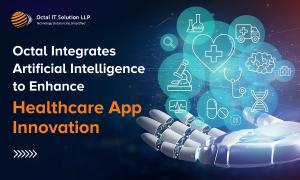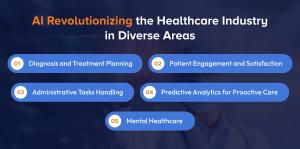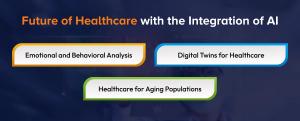
Octal Integrates Artificial Intelligence to Enhance Healthcare App Innovation
Transform Patient Care and Operational Efficiency Through AI Technologies, Octal IT Solution Experts Work Hard to Provide the Best in Healthcare Industries.
SARASOTA, FL, UNITED STATES, December 27, 2024 /EINPresswire.com/ -- Octal, a leading app development company with a specialization in creating advanced digital solutions, is working with artificial intelligence technology and integrating it with healthcare app development services. This move signals a new era of enhanced patient care, improved operational efficiency, and smarter healthcare management. By using the power of AI, Octal aims to revolutionize the way healthcare professionals interact with technology and improve patient outcomes.
With healthcare increasingly moving toward digitalization, the integration of AI technology in healthcare apps promises to address some of the most pressing challenges in the industry, including diagnosis accuracy, treatment planning, patient engagement, and administrative efficiency. Through innovative AI-driven features, Octal is enabling healthcare providers to deliver personalized care, reduce human error, and enhance organizational workflows.
This press release explores how Octal’s integration of AI into healthcare apps will elevate the healthcare industry and redefine how both providers and patients experience healthcare technology.
AI-Driven Innovations in Healthcare By Octal Meeting the Demands of Modern Healthcare Systems
The healthcare industry is changing over the past few years, driven by technological advancements and the need for more effective and accessible care. Among these latest trends, Artificial Intelligence has emerged as a game-changer that offers some of the new possibilities for automation, data analysis, and decision-making. Octal’s latest developments in AI-integrated healthcare apps aim to tackle the most complex issues in the healthcare sector by providing cutting-edge tools for medical professionals and offering more intuitive patient experiences.
1. Revolutionizing Diagnosis and Treatment Planning
One of the most significant contributions AI can make to healthcare is in the area of diagnosis and treatment planning. AI algorithms can analyze vast amounts of medical data such as medical images, test results, and patient histories far more quickly and accurately than human counterparts. By integrating AI-powered diagnostic tools into healthcare apps, Octal empowers clinicians to make more informed, data-driven decisions.
With the use of Machine learning (ML) models, a subfield of AI, historical patient data can be recognized that the human eye might miss. In radiology, for example, AI can assist in the detection of tumors, fractures, or other abnormalities in medical imaging. This speeds up diagnosis and can significantly reduce the chances of human error, leading to earlier intervention and better patient outcomes. And by leveraging this technology, Octal is providing an unmatchable experience to clients.
Moreover, AI also plays a crucial role in personalized treatment planning.. Using data from patient records, AI can help create personalized treatment regimens that take into account the individual characteristics and medical history of each patient. This leads to more effective, targeted treatments and better results overall.
2. Enhancing Patient Engagement and Satisfaction
The expert team of Octal works with AI to help improve patient engagement, which is very important for care delivery. Healthcare apps powered by AI are also helping to improve patient engagement, which is vital for effective care delivery. With the help of AI, experts are working on building top-notch AI-powered chatbots and virtual assistants that are becoming central features of healthcare apps. These AI systems provide patients with 24/7 access to information, appointment scheduling, symptom checkers, and medication reminders.
Octal not only focuses on AI but also takes advantage of subbranches of AI, such as NLP, that focus on enabling machines to understand and process human language. Octal’s AI solutions can interact with patients in a conversational manner. Virtual health assistants can help patients track their health progress, offer reminders for medications or exercise, and even help them navigate complex medical information.
Furthermore, using AI in healthcare apps also improves the accuracy of symptom tracking. Patients can input their symptoms into the app, and these amazing AI models can analyze this data alongside their medical history to identify potential causes. In turn, healthcare providers can be alerted to potential health issues earlier, facilitating proactive care and reducing the need for emergency interventions.
3. Streamlining Administrative Tasks with AI Automation
A major challenge in healthcare today is the administrative burden faced by hospitals and clinics. These tasks, while critical for the smooth operation of healthcare institutions, are time-consuming and prone to errors. From scheduling appointments to managing billing and claims processing, administrative work can eat up a significant portion of healthcare professionals' time, leaving them less able to focus on patient care.
Octal’s integration of AI into healthcare apps is designed to ease these challenges. By automating repetitive administrative tasks, healthcare providers can free up time for their staff and reduce the likelihood of human error. AI-powered solutions can handle tasks such as appointment scheduling, claims processing, and insurance verification, ensuring that these processes are faster and more efficient.
AI also plays a role in data management, where the sheer volume of information can become overwhelming. With AI algorithms in place, healthcare systems can automatically organize and analyze patient data, enabling better decision-making and operational efficiency. This leads to a smoother workflow, reduced administrative costs, and more time spent delivering high-quality patient care.
4. Predictive Analytics for Proactive Care
AI's ability to analyze vast datasets quickly is one of its most powerful capabilities. In healthcare, predictive analytics powered by AI can help identify at-risk patients, forecast disease outbreaks, and predict potential complications before they arise. And how can Octal IT Solution stay behind when they come to know the advantage of AI.
Octal’s AI-driven healthcare apps can leverage predictive analytics to detect patterns in patient data that might indicate the onset of chronic conditions, such as diabetes, hypertension, or cardiovascular disease. By identifying these patterns early, healthcare providers can take preventive measures and intervene before the conditions become more serious, ultimately reducing the need for expensive treatments and hospitalizations.
Moreover, predictive models can be used to analyze patient outcomes and forecast potential risks. By incorporating real-time patient data and historical trends, these models can help healthcare providers make more informed decisions about the type and timing of interventions.
5. Improving Mental Health Care Through AI
In the past few years, mental health issues have increased gradually, and keeping that in mind, Octal’s team started working on the various areas related to Mental health care. Mental health disorders often require personalized care, and AI can help tailor treatment plans based on the individual’s needs and history. Through AI-powered mobile apps, patients can have access to virtual therapy sessions, mood tracking, and personalized coping strategies in real time.
AI algorithms can analyze text input from patients to detect early warning signs of mental health issues such as depression, anxiety, or PTSD. With this data, healthcare professionals can intervene more promptly, offering timely support and potentially improving patient outcomes.
Furthermore, AI-powered tools can provide patients with mental health resources, exercises, and cognitive behavioral therapy (CBT) techniques, helping to improve their well-being between therapy sessions. This 24/7 accessibility and support enhance patient engagement and help foster a deeper sense of control over their mental health.
Why AI Integration is Critical for Healthcare App Development
The healthcare industry is under constant pressure to improve the quality of care while reducing costs and enhancing operational efficiency. AI provides a powerful tool to meet these challenges, and Octal is leading the charge in healthcare app innovation.
1. The Need for Personalization
Healthcare is moving away from a one-size-fits-all model to a more personalized approach, where treatments and care plans are customized to the individual patient. AI is essential in this process, as it can analyze vast amounts of data to predict what treatments will work best for each patient based on their unique characteristics.
The team of Octal working on the integration of AI helps create personalized experiences for both patients and providers. From recommending personalized health plans to predicting potential complications, AI ensures that the treatment process is far more focused on the individual, increasing the likelihood of positive outcomes.
2. Scalability and Adaptability
As the healthcare industry continues to grow, the demand for scalable and adaptable technology solutions will only increase. AI technologies can be smoothly integrated into existing healthcare systems, allowing healthcare providers to scale their services efficiently.
Octal, an AI development company, designs AI-powered apps with scalability in mind, ensuring that as healthcare providers expand or adapt their services, the underlying technology can evolve to meet their needs. Whether it’s managing a larger volume of patients, supporting new treatments, or complying with changing regulations, AI integration ensures that healthcare apps can grow with the industry.
3. Addressing Data Security and Privacy Concerns
With the rise of AI in healthcare, ensuring the privacy and security of patient data is more important than ever. Octal is committed to building AI-powered healthcare apps that comply with global standards, such as HIPAA in the U.S. and GDPR in Europe, to ensure that patient data is handled securely and ethically.
Through advanced encryption, secure cloud storage, and robust access controls, Octal ensures that healthcare providers and patients alike can trust the apps and AI tools to protect sensitive health information.
The Future of Healthcare and AI Integration
AI is one of the fastest-growing technologies in the market today and continues to evolve over the coming years. Moreover, Octal IT Solution is focused on improving different sectors' ways of doing work by utilizing AI in their work. By continuously refining AI algorithms, integrating emerging technologies like machine learning and deep learning, and collaborating with healthcare professionals, Octal aims to bring even more powerful tools to the healthcare industry. Here are some of the upcoming trends in healthcare that can be enhanced with the use of AI.
AI-Powered Emotional and Behavioral Analysis
AI will increasingly be used to analyze and predict emotions, behaviors, and mental states in real time, moving beyond just diagnosing mental health disorders to proactively managing mental well-being.
Emotional AI: Wearables, voice analysis, and facial recognition technologies will help monitor a person’s emotional state in real time. This data could be integrated into healthcare systems to adjust treatment plans for chronic conditions, especially those that are affected by stress or anxiety.
Behavioral intervention: AI systems could identify early warning signs of mental health crises based on behavior patterns, sleep cycles, voice tone, and social interactions, prompting early interventions or real-time therapeutic support.
AI-Enabled Digital Twins for Healthcare
The concept of digital twins, virtual replicas of physical objects or systems, will be applied to human health, creating a real-time digital model of a person’s body and health status. These virtual models will allow for hyper-personalized healthcare, treatment simulations, and disease progression prediction.
Personalized health simulation: Digital twins will create a fully personalized digital representation of an individual’s body, factoring in genetic, lifestyle, and environmental data. Healthcare providers can then simulate different treatment scenarios on the digital twin before applying them to the real patient, ensuring more effective and safe interventions.
Chronic disease management: Digital twins could help monitor chronic diseases like diabetes or heart disease by continuously simulating how the body is responding to treatments, allowing for real-time adjustments to therapies.
AI-Powered Predictive Healthcare for Aging Populations
AI will become a critical tool in addressing the healthcare challenges posed by global aging populations, enabling not only better care for the elderly but also improving the quality of life.
Smart aging: AI will monitor the physical and cognitive health of aging individuals, providing predictive insights into risks like falls, dementia, or heart disease. Wearables and sensors will track movements, behavior patterns, and biomarkers to enable proactive care.
Automated caregiving: AI-driven robots and virtual assistants will support elderly patients in activities of daily living (ADLs), including mobility, medication management, and even social interaction, reducing the strain on human caregivers and improving elderly patients' independence.
The future of healthcare lies in integrating AI to create smarter, more efficient, and personalized solutions. With AI, healthcare will become more responsive to the needs of patients and more efficient and cost-effective for providers. Octal’s commitment to AI integration is just the beginning of a transformation that promises to reshape the future of healthcare.
About Octal
Octal, a leading mobile and software development company, specializes in personalized solutions across multiple industries, including healthcare, finance, retail, and more. The team of Octal has more than 250 expert developers who work constantly updating their skills by learning the latest technologies and tools. This helps the team provide top- notch results in the competitive market.
Arun Goyal
Octal IT Solution
+1 817-717-1793
email us here
Visit us on social media:
Facebook
X
LinkedIn
Instagram
YouTube
Other
Transforming Healthcare with Innovative AI Use Cases
Distribution channels: Companies, IT Industry, International Organizations, Technology, World & Regional
Legal Disclaimer:
EIN Presswire provides this news content "as is" without warranty of any kind. We do not accept any responsibility or liability for the accuracy, content, images, videos, licenses, completeness, legality, or reliability of the information contained in this article. If you have any complaints or copyright issues related to this article, kindly contact the author above.
Submit your press release


